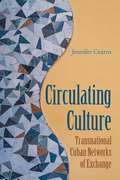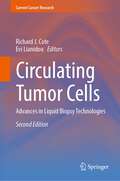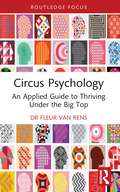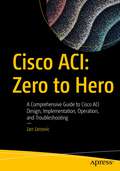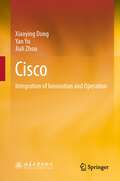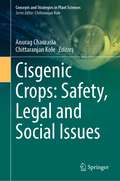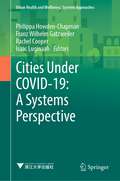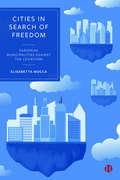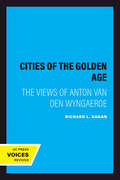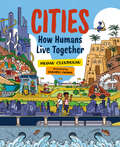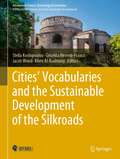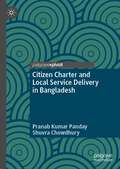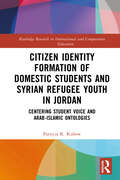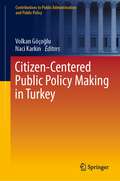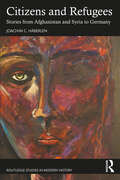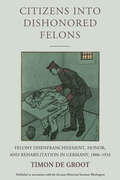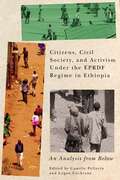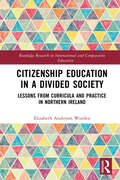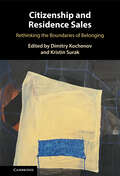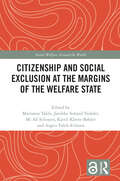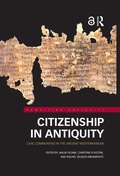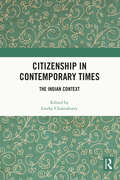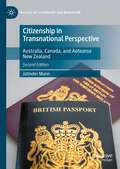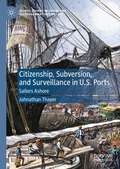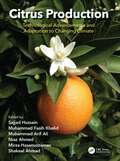- Table View
- List View
Circulating Culture: Transnational Cuban Networks of Exchange (New World Diasporas)
by Jennifer CearnsTracing the flows of people, material items, and digital content between Havana and Miami, as well as between Cuba and Panama, Guyana, and Mexico, this book demonstrates the worldmaking of marginalized Cuban communities in a transnational setting.
Circulating Tumor Cells: Advances in Liquid Biopsy Technologies (Current Cancer Research)
by Richard J. Cote Evi LianidouIt is well recognized that blood could be the optimal site for evaluating cancer, allowing easy and repeated access for determining prognosis, establishing molecular targets, evaluating the efficacy of therapy, detecting the earliest signs of recurrence, and even detecting cancer at its earliest and most curable stages. The analysis of cancer through blood samples is now known as the liquid biopsy and has been a rich source of research and clinical application. There has been an explosion of interest and progress in liquid biopsy technologies since the first edition of this book. The second edition will expand its focus to now include not only circulating tumor cells (CTC), but also other emerging aspects of the liquid biopsy, including circulating tumor DNA and methylated DNA (ctDNA, ct meDNA), ctRNA, ct miRNA, circulating tumor proteins (and other) biomarkers and circulating tumor derived exosomes (ctExosomes). CTC play a central role in tumor dissemination and metastasis, and have been established as an important evaluative and research tool in advanced cancer, and potentially important in early stage disease. CTC defines tumor cells circulating in blood, while Disseminated Tumor Cells (DTC) refers to tumor cells identified in bone marrow. CTC/DTC are extremely rare events, even in late stage cancer, and their detection has presented enormous technical challenges, with the emergence of multiple technologies developed to address these challenges, including enrichment, identification and sophisticated analytical techniques to evaluate CTC and other cells in circulation that may also be important in the biology of metastasis. As foundational as CTC/DTC has been, the field of liquid biopsy has expanded well beyond these analytes. The relevance of circulating nucleic acids derived from tumor cells has quickly progressed from research to the clinic. There are now well established clinical applications for using ctDNA/RNA to determine therapeutic targets, follow disease progression and detect cancer recurrence long before routine clinical methods. One of the most exciting new areas of work is the possibility of using these circulating tumor derived nucleic acids to detect cancer at its earliest and potentially most curable stages. Another new and burgeoning area is the detection and analysis of ctExosomes. These highly abundant particles which are actively secreted from tumor (and indeed all) cells represent a novel way to detect and define multiple analytes of importance, including proteins, DNA and meDNA, RNA, miRNA, and other cell components that are protected and preserved in these compact structures. This second edition of Circulating Tumor Cells: Advances in Liquid Biopsy Technologies is entirely new and brings together leaders and innovators in the field of liquid biopsy, including basic and molecular biologists, chemists, engineers, statisticians, experts in tumor banking, test developers, research administrators and clinicians. A special feature of this book is that it includes chapters from the members of the US National Cancer Institute Liquid Biopsy Consortium. This edition also includes many of the participants of the latest international meeting on the Advances in Circulating Tumor Cells (ACTC) which is held in Greece every two years and gathers the most important liquid biopsy investigators from around the world. Thus, this edition represents the most comprehensive and up-to-date resource for those who want to further explore the exciting field of CTC and other liquid biopsy technologies. The new edition will be useful to a wide audience including scientists studying metastasis, cancer researchers, translational scientists, oncologic surgeons, medical oncologists, members of the biopharmaceutical industry, and graduate and undergraduate students studying cancer biology.
Circus Psychology: An Applied Guide to Thriving Under the Big Top
by Fleur van RensThe lives of circus artists can be mentally and physically demanding. Circus Psychology: An Applied Guide to Thriving Under the Big Top is an evidence-based guide to nurturing the mental health of circus artists while enabling them to perform at the peak of their capacities. The book is organised into three accessible sections: mental health in circus, optimising the circus environment to facilitate thriving, and mental skills for thriving in circus. The first section introduces general mental health concepts, provides insight into the mental health of circus artists, the stress process, and the role of psychological resilience and perfectionism in mental health. The second section offers insight into motivation and engagement in circus, the features of a psychologically safe circus environment, and advice on psychologically supportive talent development environment. The final section explains, applies, and provides practice material for mental skills, including goal setting, self-talk, mental imagery, arousal regulation, and visual anticipation. Written by Dr Fleur van Rens, a circus artist and lecturer in sport psychology, this book is an essential resource for those passionate about the mental health of amateurs and professionals in the circus industry.
Cisco ACI: A Comprehensive Guide to Cisco ACI Design, Implementation, Operation, and Troubleshooting
by Jan JanovicIt doesn’t matter if you are completely new to Cisco ACI or you already have some experience with the technology, this book will guide you through the whole implementation lifecycle and provide you with a comprehensive toolset to become confident in any ACI-related task. In the beginning, it’s very important to build strong fundamental knowledge about Cisco ACI components. We'll go through underlay networking based on Nexus 9000 switches and describe the APIC controller cluster acting as the management plane of ACI. By building Access Policies, you'll see how to optimally connect servers, storage, routers, switches, or L4-L7 service devices to ACI. Then we'll properly design and implement Logical Application Policies. You will understand all the fabric forwarding behavior when using different ACI settings and architectures while getting a toolset on how to verify and troubleshoot eventual problems. This book also covers external L2 and L3 connectivity in ACI, more advanced features like integration with virtualization hypervisors and Kubernetes, service chaining of L4-L7 devices using Service Graphs, or practical approach to using REST API automation based on Python and Ansible/Terraform.Cisco ACI: Zero to Hero can additionally be used as a valuable source of theoretical and practical knowledge for all candidates preparing for CCIE DC v3.0 Written or Lab exams.What You'll LearnUnderstand network evolution and Cisco ACI components Underlay ACI networking based on Nexus 9000 switches, APIC controllers, and Application Policy ModelIntegrate ACI with virtualization hypervisors and KubernetesDynamically and seamlessly include L4-L7 service devices in communication between ACI endpoints Build ACI Anywhere: ACI Multi-Tier, Stretched Fabric, Multi-POD, Multi-Site, and Remote LeafUtilize ACI REST API with Python, related Cobra SDK, Ansible or Terraform, to develop automation and scripts on top of the ACI platformWho This Book Is ForNetwork engineers, architects, network developers, administrators or NOC technicians.
Cisco: Integration of Innovation and Operation
by Xiaoying Dong Yan Yu Jiali ZhouThis book picks Cisco as an example to propose a framework of ambidextrous integration of innovation and operation, which is the key to the success of global companies along their evolutions, especially for those technology companies. The authors try to find how the company combines active innovation and efficient operation for its sustainable development. On the basis of comprehensive analysis of the strategic leadership, change management, innovation system, M&As, IT-enabled value chains, collaboration, etc., in Cisco, as well as the interviews with Cisco staff, this book shows that management practices shape the balance of internal-external resources for explorative-exploitative innovations. IT strategies and implementation enable efficient operations when innovations are identified and justified in the leading company. Managerial insights for sustainable competitiveness can be gained from Cisco practices in this book. The companion of the book, Huawei: From Catching up to Lead, telling another growth path of technology company in China by similar framework.
Cisgenic Crops: Safety, Legal and Social Issues (Concepts and Strategies in Plant Sciences)
by Chittaranjan Kole Anurag ChaurasiaThis book is the first comprehensive compilation of existing knowledge on the impact of cisgenic crops on biodiversity, environment, and ecosystem. Strategies to create and access cisgenic crops, potential risks assessment, and legal implications across the globe (European Union, North and South Americas, Africa, and Asia) are enumerated. Ethics, economics, safety, social concerns, and consumer acceptance of cisgenic foods are deliberated. Policy paradigm and ways to overcome GM regulations through cisgenic crops are highlighted. The book has 12 chapters authored by internationally leading experts on the subject. This book will be useful especially for the policy makers and GMO regulators, while the students, teachers, and researchers from across the globe will be equally benefited.
Cities Under COVID-19: A Systems Perspective (Urban Health and Wellbeing)
by Rachel Cooper Isaac Luginaah Philippa Howden-Chapman Franz Wilhelm GatzweilerThe 15 international authors of this book live in Brazil, Canada, Cameroon, China, Cuba, European Union, Finland, Gaza Strip, India, Nepal, New Zealand, Nigeria, Sri Lanka, United Kingdom and the United States of America. The authors are linked to the International Science Council’s Urban Health and Wellbeing Programme. In this book the authors analyse the management of COVID-19, which started in late 2019, in their cities. They explain their city’s political, social and economic context, the dynamics of how the pandemic unfolded, drawing on quantitative and visual data, and their reflections on how it was managed. The book concludes with an analysis of the similarities and differences among COVID-19 outcomes in these cities. Using a systems perspective to learn from these experiences can help all cities to improve the governance of pandemics and be better prepared for likely future ones.
Cities in Search of Freedom: European Municipalities against the Leviathan
by Elisabetta MoccaOver the past decades the nation state lost its political primacy by processes of devolution, Europeanisation and globalisation, which in turn enhanced municipal autonomy. Why do some cities seek to sidestep the state and widen their sphere of action? Bridging political geography, local politics and urban sociology, this book gives a new perspective on the state’s weakening authority and the parallel rise of cities as political actors. The author considers the tensions between central states and European cities, giving a new perspective to students and researchers in the social sciences.
Cities of the Golden Age: The Views of Anton Van den Wyngaerde
by Richard L. KaganIn the sixteenth century Spain was at the height of its glory, enjoying a period of exceptional power, wealth, and artistic splendor. In 1561 Philip II commissioned Europe's leading topographical artist, Anton van den Wyngaerde, to prepare cities and towns of his Golden Age empire. Van den Wyngaerde spent most of his time traveling in Spain from 1561 until his death in 1571, preparing views—many the earliest known depictions—of no fewer than sixty-two cities and towns, including Barcelona, Valencia, Zaragoza, Granada, Córoba, Seville, Toledo, Burgos, and Madrid. These drawings not only record Spain's cities during the most glorious moments in their history but also depict them with a precision that can almost be described as photographic.
Cities: How Humans Live Together (Orca Timeline #3)
by Megan ClendenanKey Selling Points Cities takes readers on a journey to more than 75 cities on six continents. It explores what makes a city sustainable and welcoming for today and tomorrow by introducing critical questions around urban citizenship, inclusivity and environmental and social justice. Includes fun and age-appropriate facts about public toilets, what cities used to look like and more. Links to numerous curriculum themes and has been vetted by experts in history, urban planning and environmental urban policy. Asks readers to think critically about how and why cities have evolved the way they have and how that should inform the cities of the future. The author did her graduate studies in environmental urban planning.
Cities’ Vocabularies and the Sustainable Development of the Silkroads (Advances in Science, Technology & Innovation)
by Kheir Al-Kodmany Stella Kostopoulou Jacob Wood Gricelda Herrera-FrancoThis book discusses how cities’ identities are formed and developed over time and portrays architecture and the arts as the embodiment of the historical, cultural, and economic characteristics of cities. Furthermore, it explores strategies and solutions to preserve the cultural heritage along the Silk Road, representing a compilation of research addressing the economic and social opportunities and challenges related to the development of a more sustainable and responsible approach to tourism development and the preservation of heritage. As such, it covers a wide range of audiences including economists, architects, planners, tourism experts, and decision-makers interested in making use of cities' available resources and features, offering strategies to explore development opportunities through sustainable and responsible tourism along the Silk Road. This book is a culmination of selected research papers from the first version of the International Conference on "Silk Road Sustainable Tourism Development and Cultural Heritage (SRSTDCH)" which was held in 2021 in collaboration with Aristotle University of Thessaloniki, the European Interdisciplinary Silk Road Tourism Centre, Greece and the 5th Edition of the International Conference on “Cities’ Identity Through Architecture and Arts (CITAA)” which was held in 2021 in collaboration with University of Pisa, Italy.
Citizen Charter and Local Service Delivery in Bangladesh
by Pranab Kumar Panday Shuvra ChowdhuryThis book illuminates the importance of the citizen charter (CC) in local service delivery in Bangladesh. It describes how CC was implemented into the service delivery process and its impact. In the 1970s, the transition from traditional public administration to new public management was inspired by globalization, the emergence of an information and technological society, and many economic theories, such as public choice, principal-agent theory, and transaction cost. The purpose of the government in a welfare state is to serve the citizens by providing essential services. However, public service delivery in most developing nations is ineffective owing to corruption, waste of public funds, a lack of responsibility on the part of public employees, etc. In this context, CC emerged as a means of educating individuals on many elements of services, so they may hold service providers accountable. Thus, the issue of framing and implementation of CC has been put in place due to the persistent pressing of academicians, politicians, and practitioners advocating for better local service delivery.
Citizen Identity Formation of Domestic Students and Syrian Refugee Youth in Jordan: Centering Student Voice and Arab-Islamic Ontologies (Routledge Research in International and Comparative Education)
by Patricia K. KubowMoving beyond Western philosophical and political frameworks, this text engages with and centers Arab-Islamic ontologies, pupil voice, and gender to explore citizen identity formation and belonging among domestic students and Syrian refugees in Jordan. Focusing on the role of double-shift schools, educational policy, and provision, the volume interrogates how citizenship and youth identity is rooted, upheld, and altered over time. With an eye to complex historical, local, and national contexts of migration and (in)security in the Middle East, the book strives for a reconceptualization of citizen identity and education to better reflect the development of socio-civic identities amidst poverty, forced migration, and unrest. Based on direct access to 10 public schools in Jordan and using qualitative data, it applies an innovative combination of different methods to ascertain student voice to theorize education for citizenship based on real and challenging experiences of Syrian refugees as well as domestic Jordanian students. Moving beyond the traditional Western philosophies that largely frame citizenship discourses, it applies process philosophy to a field dominated by political considerations while also paying attention to social contexts. As such, it goes beyond the context of Jordan to inform regional and international discourses, policies, and initiatives surrounding refugees and education in emergencies. The book will appeal to scholars, professionals, and students in the fields of comparative and international education, citizenship youth studies, social studies, and social foundations of education, as well as those working in the formal and non-formal educational development sectors.
Citizen-Centered Public Policy Making in Turkey (Contributions to Public Administration and Public Policy)
by Volkan Göçoğlu Naci KarkinThis edited volume discusses direct citizen participation and public policymaking in Turkey. Written by a diverse group of scholars and practitioners, this book advances the field of public policy by critically examining whether and how direct citizen participation may add value to government business. Structurally, the book focuses on the core topics of public administration, the generation of public services, the design and implementation of public policies, citizens and networks, new business models, and local perspectives. Using Turkey as a case study, this volume fills a gap in the literature and will appeal to researchers interested in public policy in the MENA context.
Citizens and Refugees: Stories from Afghanistan and Syria to Germany (Routledge Studies in Modern History)
by Joachim C. HäberlenFollowing the stories of two dozen refugees from Syria and Afghanistan in 2015, Citizens and Refugees argues that we need to include the histories of these countries, notably the Syrian Revolution, into narratives of the refugee crisis. The book thus challenges a framing of the crisis that usually begins only with the moment of people fleeing. The stories it tells show refugees as citizens with a political voice engaged in struggles for participation and democracy, rather than as people in need of rescuing and integrating into new societies. It equally examines the much-celebrated German welcoming culture of 2015, arguing that it silenced political voices of those fleeing to Germany. Based on personal stories and the author’s intimate knowledge of the German welcoming culture, Citizens and Refugees intervenes into political debates about the viability of democracy. Overall, the importance of this volume stems from its suggestion that we would do well to listen to the voice of those coming to Europe as refugees. Based on both personal stories and historical analysis, Citizens and Refugees is the ideal resource for upper-level undergraduates, postgraduates, and scholars interested in migration studies and the history of Europe and the Middle East.
Citizens into Dishonored Felons: Felony Disenfranchisement, Honor, and Rehabilitation in Germany, 1806-1933 (Studies in German History #28)
by Timon De GrootOver the course of its history, the German Empire increasingly withheld basic rights—such as joining the army, holding public office, and even voting—as a form of legal punishment. Dishonored offenders were often stigmatized in both formal and informal ways, as their convictions shaped how they were treated in prisons, their position in the labour market, and their access to rehabilitative resources. With a focus on Imperial Germany’s criminal policies and their afterlives in the Weimar era, Citizens into Dishonored Felons demonstrates how criminal punishment was never solely a disciplinary measure, but that it reflected a national moral compass that authorities used to dictate the rights to citizenship, honour and trust.
Citizens, Civil Society, and Activism under the EPRDF Regime in Ethiopia: An Analysis from Below (McGill-Queen's Studies in Protest, Power, and Resistance #6)
by Camille Louise Pellerin and Logan CochraneIn 2014–15, the Ethiopian government, together with many academics and observers, was surprised by the outbreak of anti-government protests, as large-scale public contestation of the Ethiopian People’s Revolutionary Democratic Front (EPRDF) had been largely absent in the regime’s history. The dominant narrative about the EPRDF regime was that it was a top-down government, using authoritarian methods to ensure the population abided by its visions and directives, and describing its role in paternalistic ways, such as being the protector and guardian of the people.Changing this narrative, Citizens, Civil Society, and Activism under the EPRDF Regime in Ethiopia considers how citizens and civil society expressed their interests and exerted their agency in an authoritarian setting. Focusing on the EPRDF regime over a period of three decades up to 2019, the book explores civic activism in Ethiopia, presenting diverse examples of how citizens have (re)shaped the country. Challenging state-centric readings of state-society relations under EPRDF governance, this collection provides a counternarrative that emphasizes the role and agency of citizens and civil society. The contributing authors draw on a heuristic analytical framework that examines different types of interactions between civil society and state actors (co-optation, co-operation, coexistence, and contestation) and captures the ways in which civil society actors make their voices heard.At a time when authoritarian forms of governance are increasingly prevalent across the world, this critically important collection offers insight into how citizens claim their agency and challenge state power in apparently top-down contexts.
Citizenship Education in a Divided Society: Lessons from Curricula and Practice in Northern Ireland (Routledge Research in International and Comparative Education)
by Elizabeth Anderson WordenThis book examines the possibilities and realities of promoting citizenship, peace, and reconciliation through schooling in divided and post conflict societies. With specific attention to the case of Northern Ireland and the Local and Global Citizenship (LGC) initiative, the book investigates the faltering progress to develop and teach school curricula aimed at promoting citizenship as well as peace, tolerance, and mutual understanding. Following an overview of the scholarship on citizenship education, the author provides a broad social and political historical context within which to understand the educational reforms and changes that have taken place in Northern Ireland, highlighting various education initiatives of the 1970s, 1980s, and 1990s that sought to foster understanding of "the other" and promote reconciliation. The book’s focus then shifts to the implementation of the LGC, which began in 2007. Despite initially strong political support and a considerable investment in terms of financial and human resources, the LGC has had limited impact. The book analyzes the obstacles impeding its success, which include marginalization within the curriculum and competing conceptions of the purpose of education. A concluding chapter reflects upon what we can learn from the LGC’s implementation and highlights innovative recent initiatives to bring the young people of Northern Ireland together. This book will appeal to scholars and students of education studies with interests in citizenship education, peace studies, educational policy, and curricula and practice.
Citizenship and Residence Sales: Rethinking the Boundaries of Belonging
by Kristin Surak Dimitry KochenovCitizenship and residence by investment is a fast-growing global phenomenon. As of 2022, more than a third of all countries in the world offered paths to membership in exchange for a donation or investment into their economies. Yet we know little about how these programmes operate and debates in academia and the wider public are often misinformed by sensationalist cases. This book offers a multidisciplinary exploration of both citizenship and residence by investment on a global scale. Bringing together the expertise of leading legal scholars, economists, sociologists, political scientists, and historians, it provides an informative and empirically grounded assessment of the origins, operation, key causes, and the legal bases of the investment migration programmes. By so doing, the volume demystifies citizenship and residence by investment and takes a critical postcolonial global perspective, addressing key issues in belonging, exclusion, and inequality that define the world today.
Citizenship and Social Exclusion at the Margins of the Welfare State (Social Welfare Around the World)
by Asgeir Falch-Eriksen Janikke Solstad Vedeler Marianne Takle Mi Ah Schoyen Kjetil Klette-BøhlerThis book presents a critical account of how citizenship unfolds among socially marginalised groups in democratic welfare states. Legal, political and sociological perspectives are applied to offer an assessment of the extent and depth of citizenship for marginalised groups in countries which are expected to offer their members a highly inclusive form of citizenship. The book studies the legal and political status of members of a nation-state, and analyses how this is followed up in practice, by examining the subjective feelings of membership, belonging or identity, as well as opportunities to participate actively and be included in different areas of society. Showing how the welfare state and society treat citizens at risk of social exclusion and offering new insights into the conceptual interconnection between citizenship, social exclusion, and the democratic welfare state, the book will be of interest to all scholars, students and academics of social policy, social work and public policy.
Citizenship in Antiquity: Civic Communities in the Ancient Mediterranean (Rewriting Antiquity)
by Jakub FilonikCitizenship in Antiquity brings together scholars working on the multifaceted and changing dimensions of citizenship in the ancient Mediterranean, from the second millennium BCE to the first millennium CE, adopting a multidisciplinary and comparative perspective. The chapters in this volume cover numerous periods and regions – from the Ancient Near East, through the Greek and Hellenistic worlds and pre-Roman North Africa, to the Roman Empire and its continuations, and with excursuses to modernity. The contributors to this book adopt various contemporary theories, demonstrating the manifold meanings and ways of defining the concept and practices of citizenship and belonging in ancient societies and, in turn, of non-citizenship and non-belonging. Whether citizenship was defined by territorial belonging or blood descent, by privileged or exclusive access to resources or participation in communal decision-making, or by a sense of group belonging, such identifications were also open to discursive redefinitions and manipulation. Citizenship and belonging, as well as non-citizenship and non-belonging, had many shades and degrees; citizenship could be bought or faked, or even removed. By casting light on different areas of the Mediterranean over the course of antiquity, the volume seeks to explore this multi-layered notion of citizenship and contribute to an ongoing and relevant discourse. Citizenship in Antiquity offers a wide-ranging, comprehensive collection suitable for students and scholars of citizenship, politics, and society in the ancient Mediterranean world, as well as those working on citizenship throughout history interested in taking a comparative approach.
Citizenship in Contemporary Times: The Indian Context
by Gorky ChakrabortyThis book engages with evolving definitions of borders and citizenship in the public discourse in the South Asia region. The traditional understanding of citizenship and belonging in the Indian context has been fraying in recent decades. The book offers an analysis of discussions on India’s contested zones, the anxieties around identity and the implications of and reactions to the National Register of Citizens and the Citizenship Amendment Act (CAA) in different regions in the country. It interrogates the concepts of belonging, ownership and dissent through an analysis of the anti-CAA protests, the Namasudra movements, the life of Tibetan refugees in India and the precarious lives of many communities in India who are identified as stateless, refugees, migrants or outsiders. Interdisciplinary and topical, this book will be of interest to students and researchers of sociology, political science, law, refugee studies, borderland studies, migration studies, public policy, social policy and development studies.
Citizenship in Transnational Perspective: Australia, Canada, and Aotearoa New Zealand (Politics of Citizenship and Migration)
by Jatinder MannThis edited collection brings together leading and emerging international scholars who explore citizenship through the two overarching themes of Indigeneity and ethnicity. They approach the subject from a range of disciplinary perspectives: historical, legal, political, and sociological. Therefore, this book makes an important and unique contribution to the existing literature through its transnational, inter- and multidisciplinary perspectives. The collection includes scholars whose work on citizenship in settler societies moves beyond the idea of inclusion (fitting into extant citizenship regimes) to innovative models of inclusivity (refitting existing models) to reflect the multiple identities of an increasingly post-national era, and to promote the recognition of Indigenous citizenships and rights that were suppressed as a formative condition of citizenship in these societies.
Citizenship, Subversion, and Surveillance in U.S. Ports: Sailors Ashore (Global Studies in Social and Cultural Maritime History)
by Johnathan ThayerThis book argues first, that the forces of industrialization that transformed ship technology simultaneously transformed the working-class lives of merchant seamen, intensifying class conflict and producing collective networks of subversion and resistance within the urban borderland spaces of sailortowns in which sailors fought to maintain control over their mobility, agency, and rights. Second, that given their social, cultural, economic, geographic, and legal marginalization, merchant seamen have occupied essential roles at the parameters of US urban, legal, labor, immigration, and wartime history. Third, that the constellation of these histories, embedded in the encounters and negotiations that merchant seamen provoked along the nation’s coastlines and sailortowns, collectively represents a unique and essential perspective on the history of US citizenship.
Citrus Production: Technological Advancements and Adaptation to Changing Climate
by Mirza Hasanuzzaman Sajjad Hussain Shakeel Ahmad Niaz Ahmed Muhammad Fasih Khalid Muhammad Arif AliThe citrus industry is one of the world's most important fruit production industries, but global climate change, pests, diseases, and improper handling are affecting plant yields. Citrus Production: Technological Advancements and Adaptation to Changing Climate presents information on advancements in the citrus industry examining various aspects of citrus from its production to harvest. It looks at the challenges and approaches in stress tolerance improvements, increasing citrus crop productivity, and reducing postharvest losses. The book details taxonomy, genetic diversity, and metabolic and molecular responses in citrus crops, as well as abiotic and biotic stresses affecting citrus production. Featuring numerous full-color illustrations throughout, this book poses new harvesting techniques along with postharvest physiology of citrus fruits, devising strategies to prevent crop losses. Citrus Production: Technological Advancements and Adaptation to Changing Climate is an essential resource for researchers, academicians, and scientists looking to expand their knowledge of citrus, particularly horticulturists, food scientists, and botanists.
